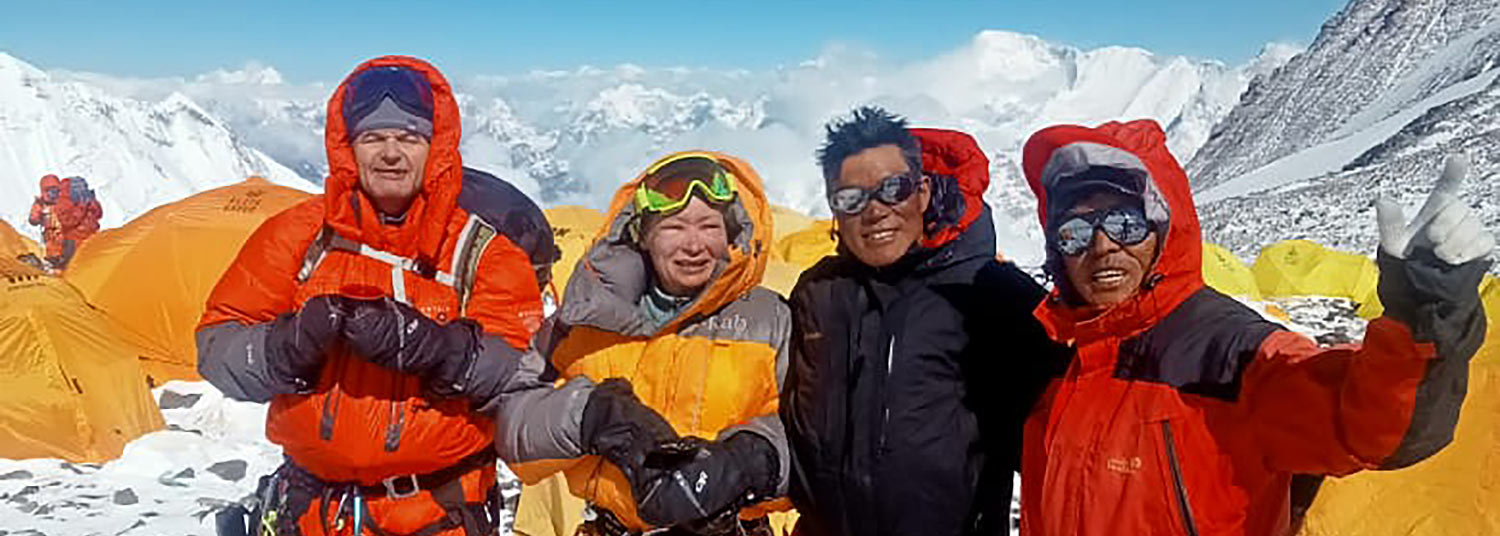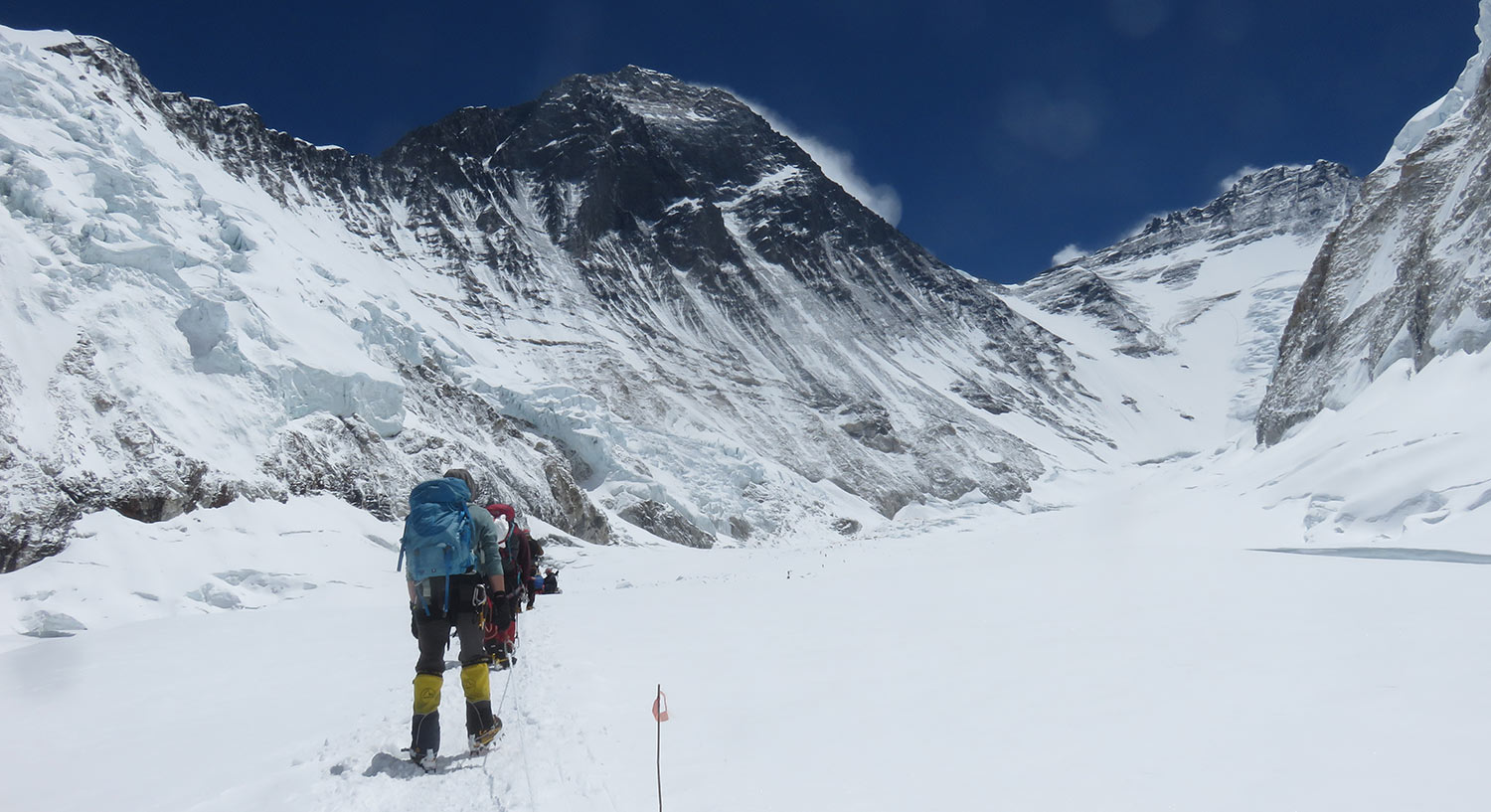November 09, 2023 | Lauren Wright
Drs. Birukov and Birukova successfully completed a two-month expedition to the top of Mt. Everest, for the second time
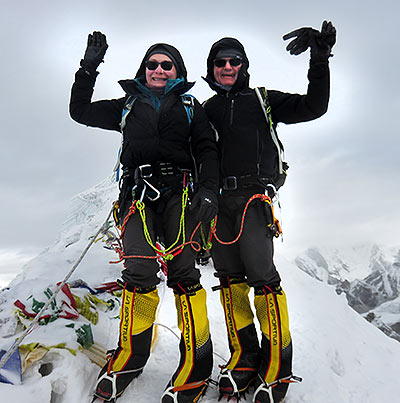 Located in the Himalayas between Nepal and Tibet, Mount Everest stands as the highest Himalayan Mountain at 8,849 meters (29,032 feet) above sea level. Considered the highest point on Earth, nearly 800 climbers attempt to trek to its peak every year.
Located in the Himalayas between Nepal and Tibet, Mount Everest stands as the highest Himalayan Mountain at 8,849 meters (29,032 feet) above sea level. Considered the highest point on Earth, nearly 800 climbers attempt to trek to its peak every year.
University of Maryland School of Medicine’s (UMSOM) Konstantin G. Birukov, MD, PhD, the Anesthesiology Endowed Professor of Entrepreneurial Research and Director of the UMSOM Lung Biology Research Program, alongside his wife Anna A. Birukova, MD, Professor of Medicine at UMSOM and Director of Pulmonary Basic Research, made the unfathomable climb to the top of Mount Everest this past spring.
Their motivation behind the climb was simple: they believed in what they were doing. Their drive to reach the top of Everest is the same force, they say, that inspires them in their research as physician-scientists. Dr. Birukov’s research focuses on the pathologic mechanisms of development and resolution of vascular endothelial dysfunction and lung injury. These are two key features of many life-threatening conditions including ARDS, shock/trauma, sepsis, and others. Dr. Birukova’s research focuses on molecular regulation of the vascular endothelial barrier and inflammation in lung disease.
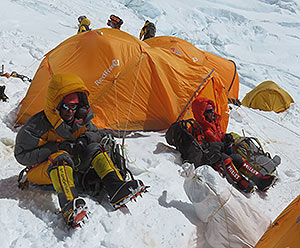 “In our scientific careers, and in the mountains, we simply believe in what we do. That is our key to success. Our motto is ‘Up, up, and up. Step by step, foot by foot, all the way to the top,’” said Dr. Birukov.
“In our scientific careers, and in the mountains, we simply believe in what we do. That is our key to success. Our motto is ‘Up, up, and up. Step by step, foot by foot, all the way to the top,’” said Dr. Birukov.
On April 12, Drs. Birukov and Birukova arrived at the Everest Base Camp in Nepal to embark on their two-month-long expedition. They spent nearly 40 days in subzero temperatures at altitudes above 18,000 feet. During several of their acclimatization climbs to the Nepalese mountain, Lobuche, and Mount Everest high camps, they reached astonishing altitudes of 20,000 and 23,000 feet. On average, climbers require three to four weeks to adapt to the high-altitude, low-oxygen environment. As second-time climbers to Mount Everest, they were well-versed in the necessary preparations to survive the summit.
“Over the years, our marathon training has helped us to prepare,” said Dr. Birukov. “We have frequented over 20-mile-long hiking trails at Great Falls Park. We also prepared ourselves by making a couple of “Rim-to-Rim-to-Rim” 47-mile, non-stop hikes in the Grand Canyon. We even summited another 26,781-foot-high Himalayan peak, Manaslu, a few years earlier and accomplished less-demanding summits including Montblanc in the French Alps and Kilimanjaro in Tanzania.”
Along with staying in shape and maintaining a healthy diet, the couple prepared a “survival pack” for the summit which consisted of the following items: climbing gear, zinc sunscreen, one-piece down suits, boots, clothing for inner layers, insulated socks, gloves, mittens, and eye protection.
“Staying in the Base Camp, we were training every day, doing ice climbing and steep hikes to maintain our fitness. Our meals mainly consisted of vacuum dried foods, vegetables, rice, and tea,” said Dr. Birukov.
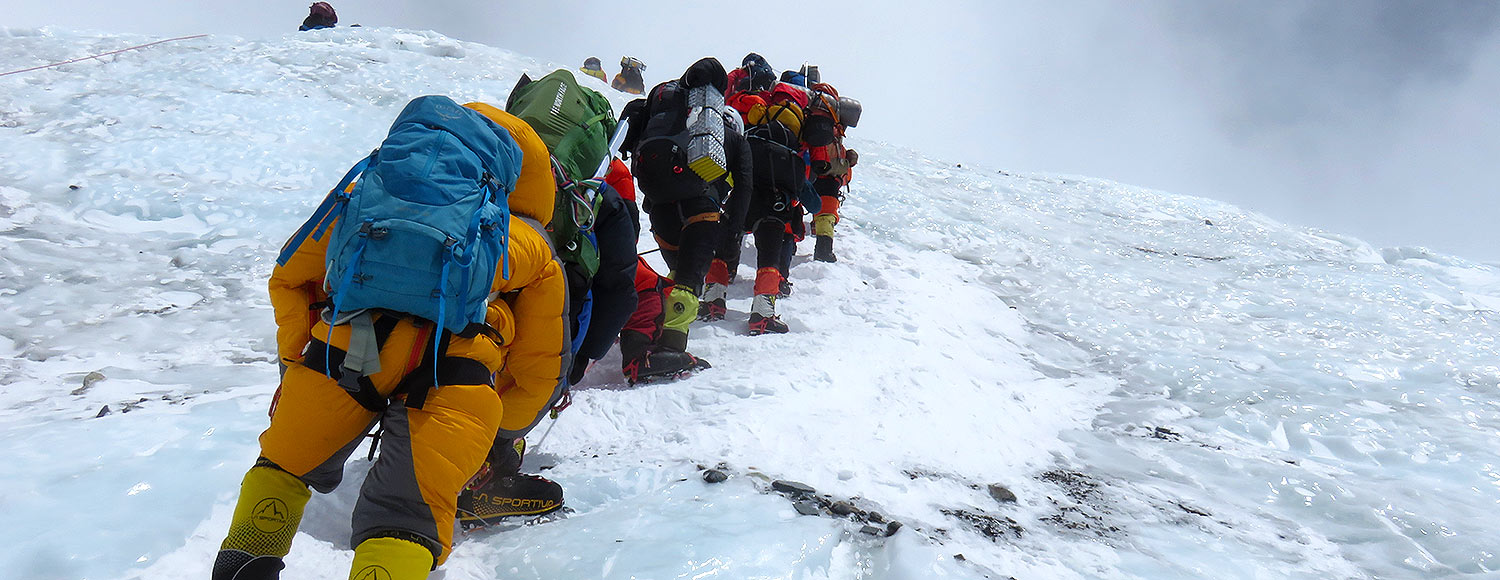
Finally, a “climbing window” opened for May 16-18, with a “mild” temperature of -20 degrees Fahrenheit and winds less than 45 mph. On May 14, the couple started their final climb. Accompanied by three Nepalese Sherpas, they endured 8 to 12-hour hikes to each of the four high camps. The weather was not cooperative as predicted, and four climbers were reported lost due to wind and blizzard conditions. On May 17, at 9 p.m., the couple started their final push from the South Col (Camp 4, 26,300 feet) to the summit. It took nearly five hours to reach the Balcony (27,600 feet), and another six hours to arrive at the South Summit (28,704 feet). Unfortunately, Dr. Birukov developed shortness of breath due to an earlier respiratory infection, so he decided to turn back. Dr. Birukova and two sherpas continued their climb to the top. Dr. Birukova summited Mount Everest at 11 a.m. on May 18. The overall climb from Camp 4 and back was 21 hours.
Undoubtedly, climbing Everest involves harsh challenges and many physical dangers. Mountaineers commonly experience extreme exhaustion, nausea, vomiting, hypoxia, headaches, hallucinations, and a lack of coordination.
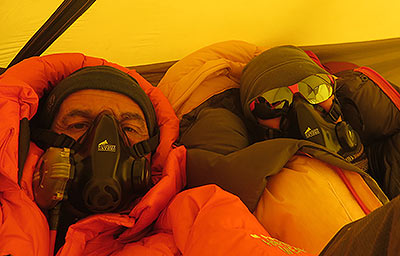 Dr. Birukov recounted, “At 21,000 feet, you begin losing air. We wore oxygen masks; however, we only had 30 percent of oxygen once we reached the high camp.”
Dr. Birukov recounted, “At 21,000 feet, you begin losing air. We wore oxygen masks; however, we only had 30 percent of oxygen once we reached the high camp.”
Climbers who reach altitudes higher than 8,000 meters (26,000 feet) enter the “death zone,” the area where human life cannot be sustained for an extended period because of insufficient oxygen pressure. Many climbers have lost their lives in the death zone due to developing high-altitude cerebral and lung edemas on the way down from the summit. According to the non-profit organization, The Himalayan Database, nearly 400 people have reportedly died on the Mountain. This season, 19 climbers died mainly due to exhaustion and mountain sickness.
Drs. Birukov and Birukova safely accomplished the amazing feat with preparation, perseverance, passion, and a great sense of purpose. They pursue great challenges, such as summiting Everest, for the purpose of self-improvement.
“We traveled to the U.S. in 1997 as junior scientists. We arrived with only two bags, and we knew the challenges ahead would require us to be mentally strong, said Dr. Birukov. “We have always believed that every time you challenge yourself and accomplish the obstacle before you, it helps you evolve into a better person.”
Photo Gallery - Click on the image below >
Contact
Lauren Wright
Public Affairs/Community Health Specialist
Managing Editor, SOM News
Office of Public Affairs & Communications
University of Maryland School of Medicine
LaurenWright@som.umaryland.edu
Office: 410.706.7508

